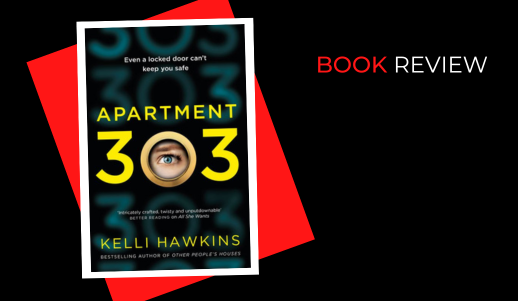by Kelli Hawkins
Publisher/year: Harper Collins/2023
Publisher blurb
Even a locked door can’t keep you safe.
Twenty-six-year-old Rory rarely leaves her apartment, though her little dog Buster keeps her company. Days are spent working for her aunt’s PI business, and watching and imagining histories for the homeless men, the Dossers, across the road. At night she walks Buster on the roof, gazes at the stars and wonders.
The night before New Year’s Eve, one of the Dossers is murdered, an incident which brings the world – police, new neighbours, her dark past and new possibilities – crashing through Rory’s front door.
She thought she was keeping her fears at bay. But has her sanctuary turned into her prison? Or is it safer for everyone if Rory stays locked away?
Reviewer: Ruth Wykes
Rory Campbell is a 26-year-old woman who lives in a third-floor apartment in Sydney with her dog, Buster. Rory is a country girl who escaped to the city after she witnessed an horrific family murder; an event that brought on OCD and PTSD in such a traumatised young woman. Apartment 303 has become her sanctuary and her prison. Rory works for her auntie who is a successful private investigator, and one of the few people Rory feels safe with.
Aside from nightly walks with Buster at the top of the high security apartment building Rory rarely ventures outside the complex. Groceries are delivered, her aunty drops in with other supplies; fear has paralysed her.
Her world has shrunk to the small spaces she can manage while she battles the demons of her past. Rory has a telescope set up by her window so she can watch birds. It’s interesting, and it’s a powerful metaphor that birds fascinate her. Is it their freedom, or because they can move through the world unhindered and unafraid? One bird especially, the Powerful Owl, only makes two brief appearances in the story. Yet I had the sense it was always there, a watchful shadow.
Rory also trains her telescope on the homeless men in the Domain car park as they settle every night. She’s invented stories about the regulars, given them names. Maybe she relates to them. Maybe she can see something of them in herself.
The opening of the story is tense and I was instantly drawn in.
One of the homeless man is murdered, and Rory is strangely affected by it. Through the lens of her telescope she watches the police activity, tries to figure out which one of “her boys” has died. At the same time she begins to suspect someone is watching her. This feeds into her PTSD, her paranoia.
Through the story we get to meet Farrah, the 14-year-old upstairs neighbour. She’s a curious and lonely teenager who invents a sneaky way to inveigles her way into Rory’s life. New neighbour, Simon, a Kiwi who is working for the Sydney Symphony Orchestra as a clarinettist finds it far more challenging to break down Rory’s personal walls. Farrah and Simon are wonderful characters, and author Kelli Hawkins, has created the perfect, yet most unlikely, pair to draw Rory’s character out. They are delightful characters, and along with Buster the dog, they are a strong reminder of the importance of connection when healing from complex trauma.
The crimes are central to the story and I loved the perspective of Rory, an unreliable narrator. And I take my hat off to Kelli Hawkins for the way she highlighted OCD and PTSD without falling into the trap of stereotyping, or of downplaying how crippling those disorders can be. Hawkins was both nuanced and sensitive in her treatment of these important issues. And at times, realistic enough to create some discomfort in this reader.
I was surprised by how much I cared about Rory and about her little dog, Buster. I epecially love the way Kelli Hawkins humanised homeless men; gave them a face, gave them stories and gently urged the reader to look at them and not turn away.
This is a tense, psychological thriller. Part murder mystery, part family drama it is beautiful written and the characters are wonderful. The crime element left me guessing until the end and the resolution surpried me.
Apartment 303 also raises important issues around mental health, and the way the mind amplifies people’s perception of danger. It shines a spotlight on vulnerable people, on those we avert our gazes from. And it reminds us all that there is hope.
In the same way that Rory couldn’t stop gazing through her telescope, I couldn’t stop reading this book. I read it in a single sitting and it stayed with me for days.
Highly recommended.
